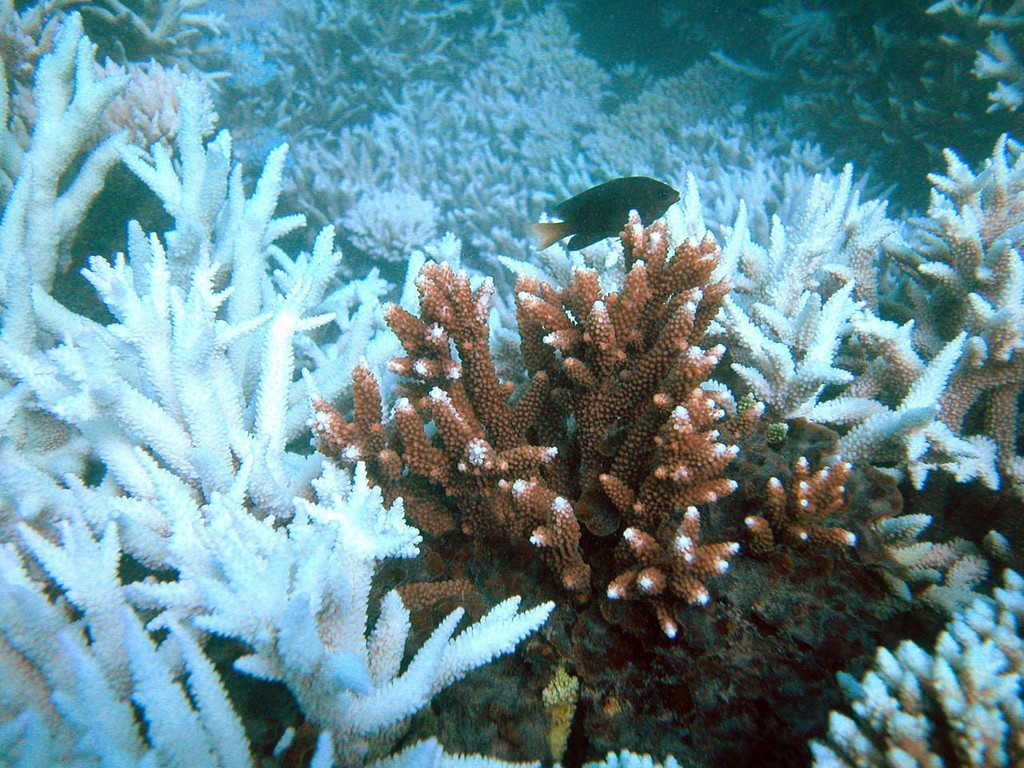Ocean life faces greater risk of large-scale extinctions
by ARC Centre of Excellence for Coral Reef Studies on 24 Aug 2012

If susceptible table and branching species are replaced by mound-shaped corals, it would leave fewer nooks and crannies where fish shelter and feed. ARC Centre of Excellence Coral Reef Studies
http://www.coralcoe.org.au/
Life in the planet’s oceans faces much greater change and risk of large-scale extinctions than at any other time in human history, a team of the world’s leading marine scientists has warned.
The researchers from Australia, the US, Canada, Germany, Panama, Norway and the UK have compared events which drove massive extinctions of sea life in the past with what is observed to be taking place in the seas and oceans globally today.
Three of the five largest extinctions of the past 500 million years were associated with global warming and acidification of the oceans – trends which also apply today, the scientists say in a new article in the journal Trends in Ecology and Evolution.
Other extinctions were driven by loss of oxygen from seawaters, pollution, habitat loss and pressure from human hunting and fishing – or a combination of these factors.
'Currently, the Earth is again in a period of increased extinctions and extinction risks, this time mainly caused by human factors,' the scientists stated. While the data is harder to collect at sea than on land, the evidence points strongly to similar pressures now being felt by sea life as for land animals and plants.
The researchers conducted an extensive search of the historical and fossil records to establish the main causes of previous marine extinctions – and the risk of their recurring today.
'We wanted to understand what had driven past extinctions of sea life and see how much of those conditions prevailed today,' says co-author Professor John Pandolfi, of the ARC Centre of Excellence for Coral Reef Studies and The University of Queensland, an authority on the fate of coral reefs in previous mass extinction events.
'It is very useful to look back in time – because if you forget your history, you’re liable to repeat it.'
Marine extinction events vary greatly. In the ‘Great Death’ of the Permian 250 million years ago, for example, an estimated 95 per cent of marine species died out due to a combination of warming, acidification, loss of oxygen and habitat. Scientists have traced the tragedy in the chemistry of ocean sediments laid down at the time, and abrupt loss of many sea animals from the fossil record.
'We are seeing the signature of all those drivers today – plus the added drivers of human overexploitation and pollution from chemicals, plastics and nutrients,' Prof. Pandolfi says.
'The fossil record tells us that sea life is very resilient – that it recovers after one of these huge setbacks. But also that it can take millions of years to do so.'
The researchers wrote the paper out of their concern that the oceans appear to be on the brink of another major extinction event.
'There may be still time to act,' Prof. Pandolfi says. 'If we understand what drives ocean extinction, we can also understand what we need to do to prevent or minimise it.
'We need to understand that the oceans aren’t just a big dumping ground for human waste, contaminants and CO2 – a place we can afford to ignore or overexploit. They are closely linked to our own survival, wellbeing and prosperity as well as that of life on Earth in general.
'Even though we cannot easily see what is going on underwater, we need to recognise that the influence of seven billion humans is now so great it governs the fate of life in the oceans. And we need to start taking responsibility for that.'
He adds 'The situation is not hopeless. If fact we have seen clear evidence both from the past and the present that sea life can bounce back, given a chance to do so.
'For example, in Australia we have clear evidence of that good management of coral reefs can lead to recovery of both corals and fish numbers.
'So, rather, our paper is an appeal to humanity to give the oceans a chance.
'In effect, it says we need to stop releasing the CO2 that drives these massive extinction events, curb the polluted and nutrient-rich runoff from the land that is causing ocean ‘dead zones’ manage our fisheries more sustainably and protect their habitat better.
'All these things are possible, but people need to understand why they are essential. That is the first step in taking effective action to prevent extinctions.'
Their paper Extinctions in ancient and modern seas by Paul G. Harnik, Heike K. Lotze, Sean C. Anderson, Zoe V. Finkel, Seth Finnegan, David R. Lindberg, Lee Hsiang Liow, Rowan Lockwood, Craig R. McClain, Jenny L. McGuire, Aaron O’Dea, John M. Pandolfi, Carl Simpson and Derek P. Tittensor appears in the online edition of Trends in Ecology and Evolution (TREE).
ARC Centre of Excellence Coral Reef Studies website
If you want to link to this article then please use this URL: www.sail-world.com/101287